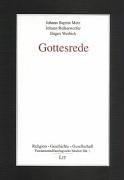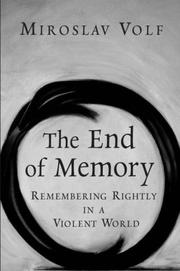| Listing 1 - 10 of 18 | << page >> |
Sort by
|
Book
ISBN: 9026313500 Year: 1995 Publisher: Baarn Ambo
Abstract | Keywords | Export | Availability | Bookmark
 Loading...
Loading...Choose an application
- Reference Manager
- EndNote
- RefWorks (Direct export to RefWorks)
Philosophical anthropology --- Memory (Philosophy) --- Philosophy
Book
ISBN: 2830908082 9782830908084 Year: 1996 Volume: 34 Publisher: Genève: Labor et Fides,
Abstract | Keywords | Export | Availability | Bookmark
 Loading...
Loading...Choose an application
- Reference Manager
- EndNote
- RefWorks (Direct export to RefWorks)
Christian theology --- Memory --- Holocaust (Christian theology) --- Religious aspects --- Christianity --- Biblical teaching --- Memory - Religious aspects - Christianity --- Memory - Biblical teaching
Book
ISBN: 9782204080811 2204080811 2204080810 Year: 2007 Publisher: Paris: Cerf,
Abstract | Keywords | Export | Availability | Bookmark
 Loading...
Loading...Choose an application
- Reference Manager
- EndNote
- RefWorks (Direct export to RefWorks)
Philosophy and psychology of culture --- Religious studies --- 216 --- Goed en kwaad --- Conferences - Meetings --- Collective memory --- Good and evil --- Memory --- Theology --- Retention (Psychology) --- Intellect --- Psychology --- Thought and thinking --- Comprehension --- Executive functions (Neuropsychology) --- Mnemonics --- Perseveration (Psychology) --- Reproduction (Psychology) --- Collective remembrance --- Common memory --- Cultural memory --- Emblematic memory --- Historical memory --- National memory --- Public memory --- Social memory --- Social psychology --- Group identity --- National characteristics --- Social aspects --- Memory - Interdisciplinary Studies - Religion, Cultural Sociology, Philosophy, Literature, History. --- History --- Religious aspects --- Political aspects --- Christianity
Book
ISBN: 9789086870844 Year: 2011 Publisher: Zoetermeer Klement
Abstract | Keywords | Export | Availability | Bookmark
 Loading...
Loading...Choose an application
- Reference Manager
- EndNote
- RefWorks (Direct export to RefWorks)
In dit boek over de herinneringscultuur 'na Auschwitz' geven Erik Borgman en Liesbeth Hoeven in een reeks korte bespiegelingen aan wat nu de bijzondere waarde en blijvende betekenis van het gedenken uitmaakt. Sporen van afwezigheid verkent in gesprek met velen, onder wie Anne Frank, uiteindelijk de stilte als ruimte van herinnering. Herinneren stelt wat verloren is, niet present. Herinneren is gedenken wat ontbreekt en met het verstrijken van de tijd steeds meer zal gaan ontbreken: de stemmen van hen die vermoord werden, hun aanwezigheid, hun bijdrage aan wie wij zijn. Wij herinneren het gemis van wat definitief verloren is en houden de plaats vrij van hen die onherroepelijk verdwenen zijn.
Collective memory --- Holocaust, Jewish (1939-1945) --- Herdenkingen ; Wereldoorlog II --- Prison psychology --- Collective remembrance --- Common memory --- Cultural memory --- Emblematic memory --- Historical memory --- National memory --- Public memory --- Social memory --- Memory --- Social psychology --- Group identity --- National characteristics --- Influence --- Psychological aspects --- Frank, Anne --- Frank, Annelies Marie --- Auschwitz (Concentration camp) --- Państwowe Muzeum Oświęcim-Brzezinka. --- State Museum of Auschwitz-Birkenau --- Staatliches Museum Auschwitz-Birkenau --- State Museum in Oświęcim --- Auschwitz-Birkenau Museum and Memorial --- Auschwitz-Birkenau Memorial and Museum --- Auschwitz-Birkenau State Museum --- Musée d'Etat d'Auschwitz-Birkenau --- Auschwitz Museum --- Państwowe Muzeum w Oświęcimiu --- Państwowe Muzeum Auschwitz-Birkenau --- KL Auschwitz --- Oświęcim (Concentration camp) --- Konzentrationslager Auschwitz --- Oshṿits (Concentration camp) --- Aušvic (Concentration camp) --- KZ Auschwitz --- Auschwitz I (Concentration camp) --- Concentration camp "Auschwitz" --- CC Auschwitz --- אוישוויץ --- אושוויץ --- אושוויץ (מחנה-ריכוז) --- מחנה אושווינצ׳ים --- Osvent︠s︡im (Concentration camp) --- Aushvit︠s︡ (Concentration camp) --- Philosophy and psychology of culture --- Christian spirituality --- Staatsmuseum Auschwitz-Birkenau --- Освенцим (Concentration camp) --- Aousvits (Concentration camp) --- Аушвіц (Concentration camp)
Book
ISBN: 2830906314 9782830906318 Year: 1991 Volume: 23 Publisher: Genève: Labor,
Abstract | Keywords | Export | Availability | Bookmark
 Loading...
Loading...Choose an application
- Reference Manager
- EndNote
- RefWorks (Direct export to RefWorks)
Vingt-et-un biblistes de Suisse, de France, d'Allemagne et d'Italie se rassemblent autour d'un thème qui n'est pas seulement très actuel. Ce thème a été aperçu par Pierre Bonnard comme une structure fondamentale dans la théologie du Nouveau Testament: le souvenir, l'anamnèse. Faire mémoire de Jésus pour comprendre le temps présent. La mémoire du Jésus terrestre est cette structure qui gouverne la vie et la pensée des premiers chrétiens ; elle est le lieu des combats théologiques de Paul, de Luc, de Matthieu, de Jean... Lieu de toutes les fidélités et de toutes les déviances. Vingt-et-un exégètes reprennent ce thème, pour en mesurer la fécondité dans le champ textuel qui leur est familier. Quel rôle joue au premier siècle la mémoire de l'histoire originaire, au gré du temps qui passe? Comment décrire, et apprécier théologiquement, la relecture de l'histoire de Jésus à laquelle procèdent les auteurs du Nouveau Testament? Ces contributions sont un hommage à Pierre Bonnard et à son œuvre d'exégète du Nouveau Testament.
Bible NT --- Memory --- Time --- Mémoire --- Temps (Philosophie) --- Religious aspects --- Christianity --- Philosophy --- Aspect religieux --- Christianisme --- Jesus Christ --- Bible. N.T. --- Criticism, interpretation, etc --- Reading --- 225 <082> --- Bijbel: Nieuw Testament--Feestbundels. Festschriften --- Mémoire --- Jesus Christ. --- Christianity.
Book
ISBN: 0691071853 Year: 1972 Publisher: Princeton, N. J. Princeton University Press
Abstract | Keywords | Export | Availability | Bookmark
 Loading...
Loading...Choose an application
- Reference Manager
- EndNote
- RefWorks (Direct export to RefWorks)
Comprehension --- Concepts --- Reason --- Reasoning --- Concept formation --- Abstraction --- Knowledge, Theory of --- Perception --- Psychology --- Understanding --- Apperception --- Learning, Psychology of --- Memory --- Argumentation --- Ratiocination --- Thought and thinking --- Judgment (Logic) --- Logic --- Mind --- Intellect --- Rationalism --- Theory of knowledge
Book
ISBN: 9783506769718 9783657769711 3657769714 Year: 2010 Publisher: Paderborn : Verlag Ferdinand Schöningh,
Abstract | Keywords | Export | Availability | Bookmark
 Loading...
Loading...Choose an application
- Reference Manager
- EndNote
- RefWorks (Direct export to RefWorks)
Im allgemeinen »Erinnerungsboom«, der seit einigen Jahren zu verzeichnen ist, gibt das Buch Auskunft über die Konturen einer »Kultur der Erinnerung«. In einer Zusammenschau aus unterschiedlichen theologischen Disziplinen werden die Fragen nach der Bedeutung der Vergangenheit für die Gegenwart und für das Gespräch mit dem Judentum neu gestellt. Denn »Erinnerungskultur« in der Gesellschaft ist eher ein Ideal als Realität. Sie bedeutet eine offene Auseinandersetzung mit der Vergangenheit – zum einen mit der Erinnerung an Auschwitz, zum anderen mit der schöpferischen jüdischen Religions-, Geistes- und Kulturgeschichte. Sie bedeutet aber auch einen intensiven Austausch mit der lebendigen Gegenwart des Judentums.
Christianity and other religions --- Judaism --- Memory --- 296*82 --- Retention (Psychology) --- Intellect --- Psychology --- Thought and thinking --- Comprehension --- Executive functions (Neuropsychology) --- Mnemonics --- Perseveration (Psychology) --- Reproduction (Psychology) --- 296*82 Dialoog joden - christenen --- Dialoog joden - christenen --- Relations --- Christianity --- Social aspects --- Christian religion --- Jewish religion

ISBN: 3825824705 9783825824709 Year: 1996 Volume: 1 Publisher: Münster: Lit,
Abstract | Keywords | Export | Availability | Bookmark
 Loading...
Loading...Choose an application
- Reference Manager
- EndNote
- RefWorks (Direct export to RefWorks)
Doctrine of God (christianism) --- God (Christianity) --- Language and languages --- Suffering --- Memory --- Religious aspects --- Christianity. --- 231 --- God. De Deo uno et trino:--dogmatisch --- 231 God. De Deo uno et trino:--dogmatisch --- Affliction --- Masochism --- Pain --- Retention (Psychology) --- Intellect --- Psychology --- Thought and thinking --- Comprehension --- Executive functions (Neuropsychology) --- Mnemonics --- Perseveration (Psychology) --- Reproduction (Psychology) --- Foreign languages --- Languages --- Anthropology --- Communication --- Ethnology --- Information theory --- Meaning (Psychology) --- Philology --- Linguistics --- Christianity --- Trinity --- Religious aspects&delete& --- Christianity and language --- Language and languages - Religious aspects - Christianity. --- Suffering - Religious aspects - Christianity. --- Memory - Religious aspects - Christianity.

ISBN: 9780802829894 0802829899 Year: 2006 Publisher: Grand Rapids, Mich. Eerdmans
Abstract | Keywords | Export | Availability | Bookmark
 Loading...
Loading...Choose an application
- Reference Manager
- EndNote
- RefWorks (Direct export to RefWorks)
Can one forget atrocities? Should one forgive abusers? Ought we not hope for the final reconciliation of all the wronged and all wrongdoers alike, even if it means spending eternity with perpetrators of evil? We live in an age when it is generally accepted that past wrongs--genocides, terrorist attacks, bald personal injustices--should be constantly remembered. But Miroslav Volf here proposes the radical idea that letting go of such memories--after a certain point and under certain conditions--may actually be the appropriate course of action. While agreeing with the claim that to remember a wrongdoing is to struggle against it, Volf notes that there are too many ways to remember wrongly, perpetuating the evil committed rather than guarding against it. In this way, "the just sword of memory often severs the very good it seeks to defend." He argues that remembering rightly has implications not only for the individual but also for the wrongdoer and for the larger community. Volf's personal stories of persecution offer a compelling backdrop for his search for theological resources to make memories a wellspring of healing rather than a source of deepening pain and animosity. Controversial, thoughtful, and incisively reasoned, The End of Memory begins a conversation hard to ignore. - Publisher.
Christian moral theology --- Memory --- Reconciliation --- 241.4 --- Religious aspects --- Christianity. --- Theologische ethiek: schuld; zonde; bekering; verzoening --- Verzoening. --- 241.4 Theologische ethiek: schuld; zonde; bekering; verzoening --- Peace making --- Peacemaking --- Reconciliatory behavior --- Quarreling --- Retention (Psychology) --- Intellect --- Psychology --- Thought and thinking --- Comprehension --- Executive functions (Neuropsychology) --- Mnemonics --- Perseveration (Psychology) --- Reproduction (Psychology) --- Religious aspects&delete& --- Christianity
Book
ISBN: 9026310110 Year: 1989 Publisher: Baarn : Ambo,
Abstract | Keywords | Export | Availability | Bookmark
 Loading...
Loading...Choose an application
- Reference Manager
- EndNote
- RefWorks (Direct export to RefWorks)
Linguistics --- evolution --- Biology --- Animal physiology. Animal biophysics --- Educational sciences --- language [general communication] --- memory --- emotion --- brains --- Hygiene. Public health. Protection --- psychology --- Psychology --- Philosophical anthropology --- Biological anthropology. Palaeoanthropology --- Developmental psychology --- psychologie --- evolutieleer --- hersenen --- 159.9 --- 612.82 --- Hersenen --- #GROL:SEMI-159.95 --- #GSDBP --- Brain --- Evolution
| Listing 1 - 10 of 18 | << page >> |
Sort by
|

 Search
Search Feedback
Feedback About UniCat
About UniCat  Help
Help News
News